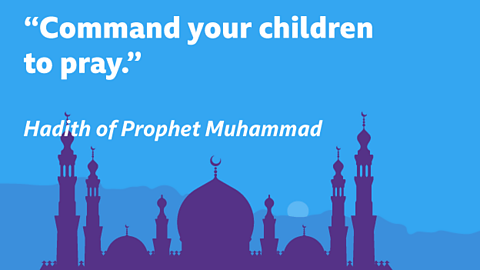Key points about relationships and family
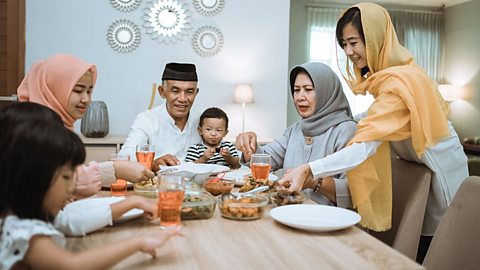
According to most Muslims, Islam teaches that family should be part of Islamic society, providing security for all its members.
Many Muslims see marriage as an essential part of life but divorce and remarriage are allowed in certain circumstances.
According to the QurвҖҷan, Allah made male and female to complete each other. Many Muslims believe this to mean that heterosexualHeterosexual is the word to describe people who are sexually attracted to people of the opposite gender. relationships are part of Allah's plan.
Muslims believe that all humans have been created by Allah from a single soul but there are differing interpretations on the roles of men and women in Islamic worship.


МэМэ
МэМэ
МэМэ
Remember
There are two main branches of Islam - Sunni and ShiвҖҷa.
Find out more about the different branches of Islam.
The nature and purpose of the Muslim family
Video
Watch the video below to compare Muslim, Jewish and Sikh attitudes and teachings towards educating children within a faith.
Muslim
Hi, I'm a Muslim.
Jewish
I'm Jewish.
Sikh
And I'm a Sikh.
Muslim
And we all believe children are a gift from GodвҖҰ
Jewish
вҖҰand that families are the building blocks of our communitiesвҖҰ
Sikh
вҖҰand society in general. But is it really a family's job to educate their children about their faith?
Muslim
Muslims try to follow the example of Prophet Muhammad (sala Allahu alayhi wasalam), who believed teaching children how to behave is really important. He said, 'a father gives his child nothing better than good manners'. And education starts straight after a baby is born, when the call to prayer is said into the baby's ears, often by the father. Seven days later, the Aqiqah ceremony takes place when the parents choose a Muslim name for their child.
Jewish
It's very similar for Jews. We believe it's a mitzvah, a commandment, to bring children up in the faith. And soon after we're born, we are usually given Hebrew names. For boys this happens on the seventh or eighth day after birth at the brit milah ceremony. Some Jews also have a special ceremony for girls called the simchat bat, which happens on the first Shabbat after her birth.
Sikh
The Sikh code of conduct, Rehat Maryada, says that it's a parent's duty to educate their children in Sikhi, and this starts as soon as possible after a baby's birth, when the parents say the Mool Mantar, the first words of the Sri Guru Granth Sahib Ji, into the baby's ears. A few weeks later, a naming ceremony called the Naam Karan takes place at the Gurdwara, our holy place of worship. Traditional Sikh names are gender neutral, so the name 'Singh', which means lion, is added for a boy and 'Kaur', princess, for a girl. So all three of us began life with a religious identity given to us by our families.
Muslim
And our education continued at home. My parents taught me my first Arabic phrases and how to pray. I learned what was halal, allowed, especially when it came to food.
Jewish
I celebrated the Shabbat every week with my family and there are lot of festivals in Judaism. Sukkot, Hanukkah, Passover, and so on that we also celebrated at home. My parents taught me what they meant and why they were important.
Sikh
When I was a baby, my parents gave me my first kara, a bangle like this, and I've worn one ever since. And they left my kesh, my hair, uncut, so it grew long.
Muslim
But educating children in a faith can't be the only purpose of a family. Because not all families are religious.
Jewish
A lot of people would say that the main purpose of a family is to raise children with love and keep them safeвҖҰ
Sikh
вҖҰand that there are other people who have the responsibility to educate them in the faith.
Muslim
Yes, the Qur'an says, 'let there be a group among you who call others to goodness'. So there are people in the wider Muslim community whose job it is to teach us. Every weekend I'd come to a madrassah like this, a school where children are taught how to write Arabic, recite the Qur'an and learn more about our faith.
Jewish
And it's similar in Judaism. Our holy building is often called a shul, which means school, because we believe that education continues our whole lives. This is where I was taught how to read and write Hebrew, and was told stories from the Torah.
Sikh
And here at the Gurdwara I enjoyed the support of the Sangat, the community of Sikhs. I learned about the Ten Gurus and was taught how to read Gurmukhi which is the written form of Punjabi, the language of the Sri Guru Granth Sahib Ji.
Muslim
So in most religious families, children are educated about the faith at home and in the wider community.
Jewish
But some people think children shouldn't be brought up in a religion. They should be free to choose their own beliefs when they're older.
Sikh
For me, it was sometimes hard growing up within a religious family, especially when other people didn't know why I did some things differently. But the religious teachings I got from my family are precious to me. Even though I used to receive comments about my long hair, which I used to tie up in a top knot, I believe challenges like that can make us stronger in our faith.
Muslim
All of our religions agree that a child's first teacher is their parent, and that our beliefs are an important part of family life.
Jewish
But the wider community also helps families to bring up their children in the religion.
Sikh
So what do you think?
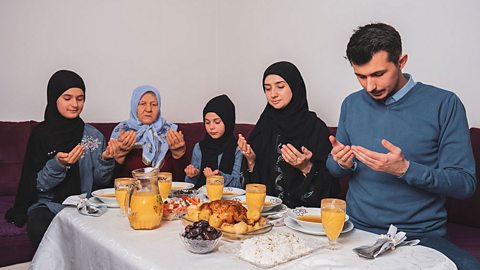
For most Muslims, the family is an important institution and can include traditionalвҖҜnuclear familyA family unit consisting of two adults and any number of children living together. The children might be biological, step or adopted., step-families or extended familyAny household which includes family members other than just parents and their children, such as cousins, grandparents or other relatives..
Depending on their culture, some Muslims see the extended family as the basis for the ummahThe worldwide, and local, community of Muslims bound together by ties of religion., therefore, different generations of families often live together. Other Muslims encourage living in a nuclear family in order for there to be privacy. Regardless of the living situation, most Muslims are encouraged to keep a strong relationship with their extended family.
Teachings from the Hadith of Prophet MuhammadThe sayings of the Prophet Muhammad, as remembered and recounted by those close to him. remind Muslims to: вҖңBe fair and just to your children,вҖқ and вҖңBlessed is he who is good to his parents.вҖқ Further teachings refer to children honouring their parents:
Be kind to parents вҖҰ do not say to them a word of contempt, nor repel them, but address them in terms of honour.вҖқ
Qur'an 17:23

In Islam, the purpose of the family can include:
To procreate вҖ“ вҖңFor every tree there is a fruit, and the fruit of the heart is the child,вҖқ (Hadith of Prophet Muhammad). Many Muslims interpret this as evidence that children are a blessing from God.
To provide stability and protection of children вҖ“ вҖңHonour your children and perfect their manners,вҖқ (Hadith of Prophet Muhammad). Many Muslim parents believe that they will be judged on how well they have raised their children.
To raise children in the Islamic faith вҖ“ For many Muslim parents, this duty includes demonstrating how to pray, how to keep halalArabic for permissible or lawful. Halal food is food that is prepared according to Islamic law. food laws and to live a good Muslim life: вҖңCommand your children to pray,вҖқ (Hadith of Prophet Muhammad). Children may also be sent to a MadrassahA school or college attached to a mosque. to learn how to read the QurвҖҷan in Arabic.
МэМэ
GCSE exam-style question
Explain two religious beliefs about the nature and purpose of family.
Refer to sacred writings or another source of religious belief and teaching in your answer.
Answers could include:
Many Muslims live in extended families. Based on cultural traditions, many Muslims see the extended family as the foundation of Islamic society. Part of that duty is to look after older members of the family who have looked after them as children: вҖңLord have mercy on them, just as they cared for me when I was little,вҖқ (QurвҖҷan 17:24).
The purpose of the Muslim family can also include raising children in the Islamic faith. Mothers will often pray with their children at home during Friday prayers. The motherвҖҷs role is seen as very important in Islam: вҖңHeaven is under the feet of the mothers,вҖқ (Hadith of Prophet Muhammad).

МэМэ
МэМэ
Exam top tip
МэМэ
For your exam, it is important to know the definitions of key terms.
Take our quiz below to test your knowledge.
Relationships and families key terms quiz
Marriage in Islam
Video
Watch the video below to compare Muslim, Christian and Hindu attitudes and teachings towards marriage.
Christian
I'm a Christian.
Hindu
I'm a Hindu.
Muslim
And I'm a Muslim.
Christian
And we all believe that marriage is important.
Hindu
And it should be for life.
Muslim
Which is fine if everything goes well.
Christian
But what if it doesn't?
Hindu
Divorce is legal in the UK,
Muslim
but do our religions ever allow it?
Christian
Christianity teaches that men and women should get married and have children.
Hindu
And it's the same in Hinduism.
Muslim
Same in Islam.
Christian
In the Roman Catholic Church, marriage is one of seven sacraments, which are holy ceremonies, so marriage isn't taken lightly. In all Christian denominations, the wedding takes place in a church, and the bride and groom make solemn promises called vows to each other and before God, to be faithful to one another and to stay together till death do us part.
Hindu
It's a HinduвҖҷs 'dharma' - our duty - to pass through four stages of life called 'ashramas'. The second ashrama is the householder stage, and it begins when someone gets married. A priest called a 'Pandit' performs the wedding ceremony, and the bride and groom make their vows in front of the sacred fire, which represents Brahman, the one unseen spirit. And, according to the Rig Veda, one of our holy books, marriage is for life.
Muslim
Many Muslims get married because that's what the Prophet Muhammad (sala Allahu alayhi wasalam), did and we want to follow his example. He called getting married вҖҳhalf the faithвҖҷ because it's that important. A Muslim wedding can take place anywhere. All you need is a marriage contract, called the вҖҳNikahвҖҷ in Arabic, and two people to witness it being signed.
Christian
Because marriage is so important, divorce has traditionally been seen as something that Christians just shouldn't do. Although Jesus did allow divorce if one or both of the partners has been unfaithful. But even if a couple are given a legal divorce, the Roman Catholic Church doesn't accept it because it believes that the couple are still married in the eyes of God. Sometimes the Church might agree that there are grounds for separation or annulment. The Church of England and other Protestant denominations, such as the Methodist Church and the United Reformed Church, do allow divorce. But some churches don't allow remarriage. It's often left up to the priest or pastor to make the decision.
Hindu
Our religion doesn't allow divorce, but that doesn't mean that Hindu marriages don't break up. In India, the Hindu Marriage Act 1955 made divorce legal. So many Hindus worldwide have taken this to mean that divorce is sometimes acceptable. But it can be hard for Hindus to remarry. Most Pandits won't perform a second marriage ceremony because Hinduism teaches that a husband and wife become one being when they get married the first time.
Muslim
It's a bit different in Islam because the marriage is mainly seen as a contract between two people, not between the couple and Allah, divorce is allowed, but only as a last resort. The Prophet Muhammad (sala Allahu alayhi wasalam), called it вҖҳthe most detestable act that God has permittedвҖҷ.
Christian
I believe that people should get married if they're going to have children, so it's a big commitment. It's a spiritual and legal bond which should last a lifetime. But even though as a Catholic, I'm taught that divorce is never okay, I personally think that in cases where someone's being unfaithful or if there's abuse happening, then divorce should be an option because I believe that God is loving and forgiving.
Muslim
Every case is different. And Muslims believe that Allah is Al- Ghaffar, the Great Forgiver, and understands that sometimes we humans get things wrong and need another chance.
Hindu
We all believe that marriage is a gift from God.
Christian
And that gift shouldn't be wasted.
Muslim
So divorce should always be a last resort. But what do you think?
The nature and purpose of marriage
According to most Muslims, Islam teaches that marriage provides a stable and secure environment for the family. For many Muslims, marriage represents a faithful lifelong partnership and a social contract between two families which affects the whole ummahThe worldwide, and local, community of Muslims bound together by ties of religion.. Many Muslims believe that Allah created marriage for the sharing of love and companionship.
There is nothing like marriage, for two who love one another.вҖқ
Hadith of Prophet Muhammad
Many Muslims believe that marriage is the foundation for family life. Young men are encouraged to marry because: вҖңWhen a man marries, he has fulfilled half of his religion,вҖқ (Hadith of Prophet Muhammad).
Many Muslims see marriage and procreation as a duty, and the life-choice to remain unmarried and celibateChoosing to not have sexual relationships. is viewed as going against the teachings of Muhammad.
The wedding ceremony in Islam
The legal definition of marriage in the UK now includes same-sex marriage, which means all citizens can legally have a same-sex civil marriage. However an Islamic marriage contract is only valid between a man and a woman.
Polygamy
polygamyPolygamy is the practice of having more than one spouse. is illegal in the UK, but it is allowed under certain circumstances under Islamic Law where the laws of the country permit it.
МэМэ
GCSE exam-style question
Explain two beliefs about the nature and purpose of marriage in Islam.
Refer to sacred writings or another source of religious belief and teaching in your answer.
Answers could include:
Many Muslims believe that marriage is ordered by Allah and should be a lifelong commitment between a man and a woman: вҖңWhen a man marries he has fulfilled half of his religion,вҖқ (Hadith of Prophet Muhammad).
Islam teaches that marriage is the ideal environment to raise children and provides a stable and secure foundation where the Islamic faith can be learnt and accepted: вҖңCommand your children to pray,вҖқ (Hadith of Prophet Muhammad).
Divorce and remarriage
Divorce
In Islam marriage is seen as an unbreakable bond. The Hadith of Prophet MuhammadThe sayings of the Prophet Muhammad, as remembered and recounted by those close to him. teaches: "Marry and do not divorce; the throne of Allah shakes due to divorce".
The Hadith also teaches:
Of all the lawful acts the most detestable to Allah is divorce.вҖқ
Hadith of Prophet Muhammad
A Muslim couple and their families are expected to work hard towards reconciliation to save their marriage:
If you anticipate a split between them, appoint a mediator from his family and another from hers. If they desire reconciliation, Allah will restore harmony between them.вҖқ
QurвҖҷan 4:35
However divorce is acceptable if all efforts to save a marriage have failed. Divorce can be declared verbally or in writing according to Sharia law however, in the UK, there should also be a legal civil divorce.
Remarriage
According to the Qur'an, if divorce occurs then the man should ensure that the wife is cared for until remarriage: вҖңFor divorced women maintenance must be given on a reasonable level. This is a duty on the righteous,вҖқ (QurвҖҷan 2:241).
МэМэ
GCSE exam-style question
Explain two Muslim beliefs about divorce.
Refer to sacred writings or another source of religious belief and teaching in your answer.
Answers could include:
Most Muslims believe that every effort should be made to prevent a divorce: вҖңIf you anticipate a split between them, appoint a mediator,вҖқ (QurвҖҷan 4:35).
However, if mediation is not successful, a divorce can be approved and many Muslims believe that Allah will still care for each party of the divorced couple: вҖңBut if they separate by divorce, Allah will enrich each of them from His abundance,вҖқ (QurвҖҷan 4:130).
In pictures: Families and marriage in Islam
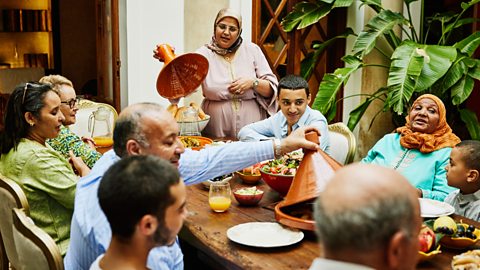
Image caption, Depending on their culture, some Muslims see the extended family as the basis for the ummah and often, different generations of families live together.
Image caption, Many Muslims believe that Allah created marriage for the sharing of love and companionship.
Image caption, It is important for Muslim families that parents should be respected throughout their lives and into old age.
1 of 3
What does Islam teach on same-sex marriage?
The Qur'an teaches that sex should only take place within marriage and that procreation is part of Allah's plan. Therefore, many Muslims would forbid homosexual relationships, since marriage can only take place between a man and a woman and procreation isnвҖҷt possible for a homosexualityBeing attracted to people of one's own sex or gender. couple.
The QurвҖҷan suggests that people who feel same-sex attraction shouldnвҖҷt act upon their feelings:
Why do you [men] lust after fellow men, leaving the wives that your Lord has created for you? In fact, you are a transgressing people.вҖқ
QurвҖҷan 26:165-166
Despite this, some Muslims accept that same-sex attraction itself isnвҖҷt considered sinful, since feelings cannot be controlled; only acting upon these feelings is forbidden. For such Muslims, celibacyRefraining from all sexual relations. is encouraged.
Muhammad condemned homosexuals who acted upon their sexual desires in a way that goes against Islamic teachings.
The QurвҖҷan tells the story of Prophet Lut (Lot) who spoke against people in his community who were doing this:
You commit a shameful deed вҖҰ You lust after men instead of women!вҖқ
QurвҖҷan 7:80-81
Many Muslims believe that those who have sexual relationships which go against Islamic teachings, such as homosexual relationships, will have to answer to Allah on the Day of Judgement.
Sex before marriage
Many Muslims believe that sex is a gift from Allah. The QurвҖҷan teaches that the best place for a sexual relationship should be within marriage since your spouse should be a source of comfort:
They (women) are garments for you (men) and you are garments for them.вҖқ
QurвҖҷan 2:187
Therefore, most Muslims believe in being chastityRefraining from all sexual intercourse. before marriage and cohabitation is often viewed as wrong.
Teachings in the Hadith of Prophet MuhammadThe sayings of the Prophet Muhammad, as remembered and recounted by those close to him. suggest that a man and woman should not be alone with one another unless they are MahramAn Islamic spouse or close relative. to each other.
The Qur'an forbids sex before marriage as it is viewed as unlawful sex in Islamic law.
Adultery
Most Muslims believe that faithfulness is very important within marriage and Islam teaches that adulterySexual intercourse between a married person and a person who is not their spouse. is wrong.
And do not come near to adultery, for it is an outrageous act, and an evil way to act.вҖқ
QurвҖҷan 17:32
For many Muslims, adultery is seen as a very serious sin because of the pain and disharmony it can cause in the ummahThe worldwide, and local, community of Muslims bound together by ties of religion..
When a man commits adultery, faith departs from him as if it were a cloud overhead.вҖқ
Hadith of Prophet Muhammad
Contraception
Most Muslims believe that children are a gift and blessing from Allah: вҖңHe creates whatever He wills. He blesses whoever He wills with daughters, and blesses whoever He wills with sons,вҖқ (QurвҖҷan 42:49).
Therefore, some Muslims oppose the use of contraception and believe that it contradicts what Allah expects and some of MuhammadвҖҷs teachings on procreation:
Marry the one who is fertile and loving, for I will boast of your great numbers.вҖқ
Hadith of Prophet Muhammad
However, most Muslims accept the use of contraception within marriage and some Muslims believe that there are times when bringing a child into the world would be irresponsible and cause suffering.
МэМэ
GCSE exam-style question
What is meant by the term adultery?
Adultery describes the act of sexual intercourse between a married person and someone who is not their spouse.
The roles of men and women
Muslims believe that Allah created men and women, and they are therefore equal.
But who so does good works, whether male or female, and is a believer, such shall enter heaven.вҖқ
QurвҖҷan 4:124
Traditionally, only men could be imamImams deliver sermons, lead prayers and provide guidance to their congregations in Mosques. in the Islamic leadership hierarchy: вҖңBut the men have a degree over them in responsibility and authority,вҖқ (QurвҖҷan 2:228).
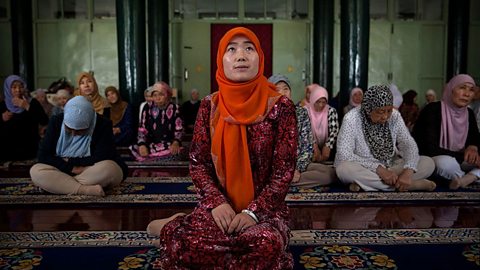
However, there are some key women in Islamic history who hold great importance. For example, there are four women in Islamic sources, both Shi'a and SunniThe two main branches of Islam., who are given the status of the most reveredRegarded as worthy of great respect and honour. women in Islam: Asiya wife of Pharaoh, Mary mother of Jesus, Khadija wife of the Prophet, and Fatima, the daughter of the Prophet and Khadija.
In Islam today it is unusual for women to be imams, unless it is leading a women-only mosque. For example, female Imam Yonghua Zheng leads Friday prayers at a women's only mosque in China.

There are several Islamic teachings that place a high value on a mother bringing up her children, whilst men are expected to financially provide.
Some Muslims believe that women can perform religious duties at home, but they may also believe that when going on HajjThe annual pilgrimage to Mecca that every Muslim should make at least once in their lifetime according to the Five Pillars of Islam., a female should be accompanied by a male member of the family.
However, other Muslims believe that women can perform religious duties at the mosque as well as at home, and donвҖҷt need to be accompanied by a male relative during Hajj.
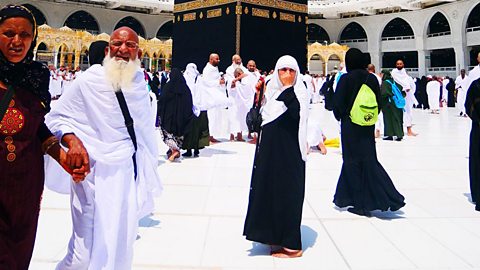
Men are the caretakers of women, as men have been provisioned by Allah over women and tasked with supporting them financially. And righteous women are devoutly obedient.вҖқ
QurвҖҷan 4:34МэМэ

GCSE exam-style question
Explain two religious beliefs about the role of men and women.
Refer to sacred writings or another source of religious belief and teaching in your answer.
Answers could include:
There are several Islamic teachings that place a high value on a mother bringing up her children, whilst men are expected to financially provide. Some Muslims believe that women can perform religious duties at home. They may also believe that when going on Hajj, a female should be accompanied by a male member of the family. This is based on an understanding from this verse: вҖңMen are the caretakers of women, as men have been provisioned by Allah over women and tasked with supporting them financially. And righteous women are devoutly obedient and, when alone, protective of what Allah has entrusted them with,вҖқ (QurвҖҷan 4:34).
However, many modern Muslim families, in the UK for example, may share the parenting duties, particularly if both of the couple have jobs outside of the home. Some Muslims believe that as long as there is mutual support, and care based on the Qur'an teaching that: вҖңThey (women) are garments for you (men) and you are garments for themвҖқ (QurвҖҷan 2:187), then a more modern accepted belief about the role of men and women, is that it be based on the individual circumstances of the couple.
Islam scripture quiz
Relationships and families Islam quotes
1 of 5
